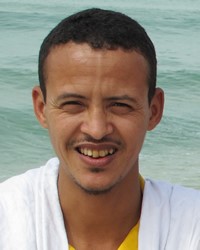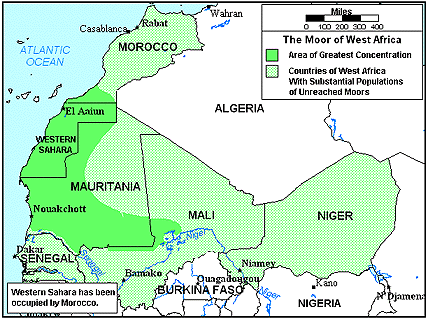The term "Moor" is generally applied to any person, regardless of skin color, who speaks one of the Hassaniya dialects. Therefore, there are both black and white Moors who speak the same language. This language, in its purest form, draws heavily from the original Yemeni Arabic spoken by the Bani Hassan tribe, which invaded northwest Africa during the sixteenth and seventeenth centuries. Moorish society is primarily nomadic and is organized into successive ranks of tribes, clans, sub-clans, and tent units. Several tribes form a tribal alliance. Their social structure resembles that of other Saharan and Arab tribal societies, with variations due to the West African environment and history. Over the years, many wars, bandit raids, and organized attacks took place in this region, causing the nomads to live in a constant state of insecurity. As a result, a complex social structure emerged. Today, the Moors have four basic class divisions based on heritage, race, and occupation. The White Moors) form the two upper classes, while the Black Moors make up the two lower classes. A White Moor is ethnologically defined as "a nomad of Berber-Arab origin." They represent the two upper classes of Moorish society: the 'adma (nobility) and the lahma (commoners). The 'adma is further sub-divided into two groups: the hassan and the zawya (warriors and religious leaders). The responsibility of the warriors is to protect the religious leaders. In turn, the religious leaders provide moral, spiritual, legal, and political services for their protectors. They also instruct their children, minister to their sick and wounded, act as intercessors between God and man, chase away evil spirits, prevent curses, and settle disputes. In this way, the hassan and the zawya benefit each other. The lahma (commoners) are also grouped into classes which act as servants to either the warriors or the religious leaders. The lahma are only allowed to marry within their own social class. Some of the lahma may be warriors or religious leaders; however, modern governmental orders to disarm have led most of them to become monks or nuns. The Black Moors make up the lower classes of Moorish society. They live in a world of their own, usually one of near slavery. There are two types of Black Moors: the 'abd-le-tilad (those slaves who belong to the tents and are part of the family), and the 'abd-le-tarbiya (acquired slaves). Even though slavery is now against the law, it continues to be a fundamental part of the social and economic structure of the Moors. Though the Moors are most numerous in Mauritania, there are many who live in nearby countries in Northwest Africa especially Morocco, Western Sahara and Senegal. There are a smaller number of Moors in Gambia, Niger, Niger, and Libya. Some also live in Europe.
The Moors are primarily farmers. However, the Black and White Moors of Morocco are relatively urbanized and work in various trades. This has caused the traditional structures of Moorish society to change considerably. The Moors are a very proud people, conveying a sense of superiority to others in the area. Parents pre-arrange marriages, with the groom's father requesting the hand of the bride. A Moorish woman does not marry against her family's wishes. She is given a dowry (money or property) upon marriage. When Moors from different nomadic tribes meet, they follow certain rigid customs. These customs (a consequence of the long history of raids in the desert) are used by the groups to regulate the meeting. For example, when conversing, they use several mannerisms to indicate their involvement in the conversation. If a Moor blows on his hand during a conversation, it means he does not believe anything that is being said. If he puts his finger in his ear, it means that he is not interested in what is being said. Each tribe believes that they are the descendants of a common male ancestor. At times this has led to open hostility between tribes. However, tribes often have peaceful competitions as a means of securing their ancestral, tribal positions. The traditional ranking order of the tribes greatly affects the personal relationships Moors have with one another, whether in the desert, in town or in the city.
The Moors are virtually all Sunni (orthodox) Muslims. Islam is based on the teachings of Mohammed. They believe their holy book, the Koran, was given to Mohammed by the angel Gabriel. There are five essential duties in Islam: (1) to affirm that there is no god but Allah, and Mohammed is his prophet; (2) to pray five times a day while facing Mecca; (3) to give alms generously; (4) to observe prescribed fasts; and (5) to try to make at least one pilgrimage to Mecca. The Moors acknowledge two main Islamic brotherhoods: the Qadiri and the Tajani. The Qadiri is the most widespread group and is characterized by many secret societies that are saturated with mysticism. Tajani is also based on mysticism, but it has become more popular in West Africa than in North Africa.
Unfortunately, there has been little response to the gospel among the Moors. Prayer is the key to seeing them reached with the gospel.
Pray for an abundant harvest among the Moors in Morocco this year as a testimony of his goodness and power. Pray for spiritual hunger among the Moors, especially among their leaders and decision-makers. Pray for the Holy Spirit to thrust out faithful workers to the Moors in Morocco. Pray for a Disciple Making Movement among the Moors that will spread throughout north and western Africa.
Scripture Prayers for the Moor, Beidane (White) in Morocco.
| Profile Source: Joshua Project |












